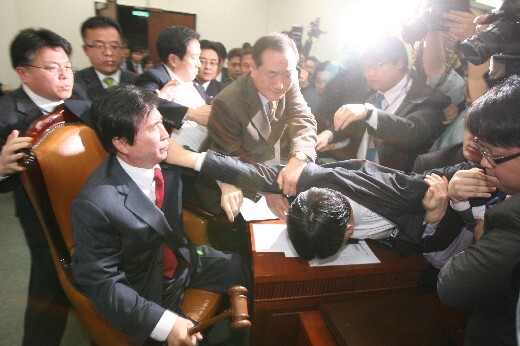hankyoreh
Links to other country sites 다른 나라 사이트 링크
GNP puts the controversial media laws before committee

The ruling Grand National Party (GNP) has suddenly sent new media-related legislation, the most controversial of the legislation before February’s extraordinary National Assembly session to the committee.
The Democratic Party is saying the move violated procedures and is there fore “completely invalid,” while the National Union of Media Workers says it is going to resume its strike starting February 26.
At 3:49 p.m. February 25, the GNP’s Ko Heung-kil, chairman of the Culture, Sports, Tourism, Broadcasting and Communications Committee made the surprise declaration that he was bringing the no less than twenty two pieces of legislation relating to the broadcast media before the committee.
“As committee chairman, it appears I have no choice but to invoke my authority under Article 77 of the National Assembly Act to bring the twenty two media-related bills before the committee,” said Ko, adjourning the meeting with his gavel after formally announcing the action. The committee chamber was instantly filled with protests from opposition members of the Assembly, with Democratic Party members trying to seize the gavel and GNP members wrestling to keep them from making off with it.
Ko immediately released a statement, in which he said that while sending bills before the committee “is the first step in mutual agreeing to vote” on legislation, “still refusing to have it seen by committee goes against the agreement between the ruling and opposition parties of January 6.” He again cited National Assembly Act Article 77, which covers the topic of “Change of Agenda.”
Democratic Party floor spokesman Cho Jeong-sik, however, claimed Ko’s maneuver did not satisfy the requirements for “change of agenda” in Article 77. He said the bill was distributed to committee members only after the fact, and that there is “no such bill called the ‘Media Act’,” which Ko said he was putting before committee, and that “therefore the move was invalid for not having followed procedures.”
National Assembly Speaker Kim Hyong-o issued a statement later in the day.
“I will be forced to decide matters as Speaker if, as is the case now, the current extraordinary session meets on the floor without there being dialogue and compromise,” he said, proposing that ruling and opposition floor leaders meet in his office on February 26.
Heo Yong-beom, the yet-to-be-confirmed spokesman of the National Assembly, quoted Kim as also saying that he “will be resolute in exercising my authority as the Speaker, entrusted with the normal operation of the National Assembly, from the perspective of the state and the people, as vested in me by the constitution and the law.”
Meanwhile, at the Foreign Affairs, Trade, and Unification Committee the GNP organized a meeting of a legislation review subcommittee and voted to approve the bill to ratify the free trade agreement (FTA) with the United States and send the bill to full committee. Members of the Democratic Party said it was “illegal and invalid” for the bill to ratify to have been put before members in the first place in December, and left the meeting in unison immediately before the subcommittee vote.
The National Union of Media Workers, in response to the GNP’s tactics said it will resume on February 26 a strike it called off on January 6. The decision was made by an emergency union meeting of representatives from member media company unions, after a “rally for a general strike struggle” in front of the National Assembly building later in the day, with approximately 500 members participating.
Please direct questions or comments to [englishhani@hani.co.kr]
Editorial・opinion
![[Column] Season 2 of special prosecutor probe may be coming to Korea soon [Column] Season 2 of special prosecutor probe may be coming to Korea soon](https://flexible.img.hani.co.kr/flexible/normal/500/300/imgdb/original/2024/0426/3317141030699447.jpg) [Column] Season 2 of special prosecutor probe may be coming to Korea soon
[Column] Season 2 of special prosecutor probe may be coming to Korea soon![[Column] Park Geun-hye déjà vu in Yoon Suk-yeol [Column] Park Geun-hye déjà vu in Yoon Suk-yeol](https://flexible.img.hani.co.kr/flexible/normal/500/300/imgdb/original/2024/0424/651713945113788.jpg) [Column] Park Geun-hye déjà vu in Yoon Suk-yeol
[Column] Park Geun-hye déjà vu in Yoon Suk-yeol- [Editorial] New weight of N. Korea’s nuclear threats makes dialogue all the more urgent
- [Guest essay] The real reason Korea’s new right wants to dub Rhee a founding father
- [Column] ‘Choson’: Is it time we start referring to N. Korea in its own terms?
- [Editorial] Japan’s rewriting of history with Korea has gone too far
- [Column] The president’s questionable capacity for dialogue
- [Column] Are chaebol firms just pizza pies for families to divvy up as they please?
- [Column] Has Korea, too, crossed the Rubicon on China?
- [Correspondent’s column] In Japan’s alliance with US, echoes of its past alliances with UK
Most viewed articles
- 1Samsung subcontractor worker commits suicide from work stress
- 2‘We must say no’: Seoul defense chief on Korean, USFK involvement in hypothetical Taiwan crisis
- 3[Editorial] Korea’s surprise Q1 growth requires objective assessment, not blind fanfare
- 4Division commander ordered troops to enter raging flood waters before Marine died, survivor says
- 5Is Japan about to snatch control of Line messenger from Korea’s Naver?
- 6No good, very bad game for Korea puts it out of Olympics for first time since 1988
- 7US overtakes China as Korea’s top export market, prompting trade sanction jitters
- 8N. Korean delegation’s trip to Iran shows how Pyongyang is leveraging ties with Moscow
- 9Korea’s 1.3% growth in Q1 signals ‘textbook’ return to growth, says government
- 10[Column] Season 2 of special prosecutor probe may be coming to Korea soon